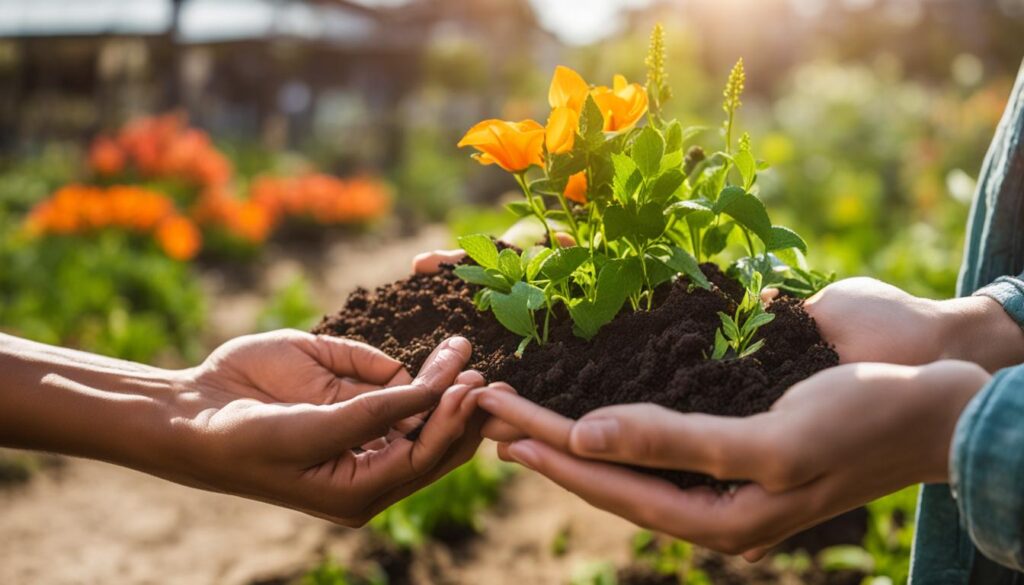Research suggests that giving to others can bring happiness and rewards to both the giver and the recipient. Giving has been shown to have numerous psychological and physiological benefits, such as increasing happiness, boosting health, and alleviating depression. The act of giving activates core areas of the brain associated with reward and pleasure. Our innate predisposition to giving is rooted in our evolutionary history and our social nature as humans. Understanding the psychology of generosity can help us better comprehend why we give and how to make giving a habit.
Key Takeaways:
- Giving has psychological and physiological benefits, including increased happiness and improved well-being.
- The act of giving activates reward and pleasure centers in the brain.
- Generosity is rooted in our evolutionary history and social nature as humans.
- Understanding the psychology of generosity can help us develop a habit of giving.
- Giving benefits both the giver and the recipient, creating a positive impact on society.
The Benefits of Giving
Giving is not only a selfless act, but it also brings numerous benefits to both the giver and the recipient. Research has shown that generous behavior has a positive impact on our physical and mental well-being.
Several studies have found that individuals who engage in giving activities experience increased happiness and overall life satisfaction. When we give money or resources to others, we activate the pleasure centers in our brain, leading to a heightened sense of joy and fulfillment. This “warm glow” of giving is accompanied by the release of neurochemicals like oxytocin and endorphins, which further enhance our positive emotions.
Generous behavior has also been linked to improved mental health. Volunteers who engage in acts of giving are less likely to experience depression and have a lower risk of mortality. By focusing on the needs of others and practicing empathy, we shift our perspective and gain a sense of purpose in our own lives.
Furthermore, giving has been found to have universal benefits across different cultures and socioeconomic backgrounds. Regardless of our financial situation, contributing to the well-being of others increases our social connectedness and fosters a sense of community. It allows us to experience the power of collective impact and reinforces our shared humanity.
“The best way to find yourself is to lose yourself in the service of others.” – Mahatma Gandhi
Understanding the motivations behind giving and the psychological factors that influence generosity can help us cultivate a habit of giving and maximize the benefits for both ourselves and those we help.
| Benefits of Giving | For the Giver | For the Recipient |
|---|---|---|
| Increased happiness | Engaging in acts of generosity triggers the release of feel-good neurochemicals, leading to a sense of joy and fulfillment. | Receiving help and support from others improves well-being and creates a positive ripple effect. |
| Improved mental health | Generous behavior reduces the risk of depression and provides a sense of purpose and fulfillment. | Knowing that others care about their well-being enhances recipients’ overall mental well-being. |
| Enhanced social connectedness | Giving fosters a sense of community, strengthens relationships, and promotes social cohesion. | Receiving support from others increases a sense of belonging and reinforces social bonds. |
Why We Give
Our propensity for giving is rooted in evolution and our social nature as humans. We have a predisposition to care for the vulnerable and help others in need.
Giving is linked to empathy, which allows us to understand and feel the emotions of others. When we empathize with someone’s suffering or hardship, we are more likely to engage in acts of kindness and generosity.
Prosocial behavior, which encompasses acts of kindness and generosity, is driven by our innate desire to help others and contribute to the well-being of our communities. It’s a fundamental part of what makes us human.
Research suggests that giving not only benefits others but also enhances our own sense of meaning and purpose. When we give, we experience a profound sense of fulfillment and a deeper connection to humanity.
The Power of Altruism
Altruism is at the core of giving. It involves selflessly putting others’ needs before our own, without expecting anything in return. Altruistic acts are motivated by a genuine concern for the well-being of others.
Studies have shown that acts of altruism increase happiness and well-being, leading to a more fulfilling life. Giving selflessly can create a positive ripple effect, inspiring others to also engage in acts of kindness and generosity.
| Prosocial Behavior | Benefits |
|---|---|
| Enhanced sense of community | 🌍 |
| Increased happiness and well-being | 😊 |
| Positive impact on others’ lives | 🤝 |
The Hero Within Us
Deep within each of us lies the potential to be a hero through our acts of giving. Whether it’s donating money, volunteering our time, or simply offering a helping hand, we have the power to positively impact the lives of others.
Embracing generosity and altruism not only benefits those we help but also cultivates a sense of purpose and fulfillment within ourselves. It is through acts of giving that we tap into our fullest potential as compassionate and empathetic human beings.

As we continue to explore the psychology of generosity, we discover the incredible capacity for empathy and kindness that resides within us. Giving is not only a way to contribute to the well-being of others, but also a path to personal growth and fulfillment. Let us nurture our innate desire to help and uplift others, for in doing so, we unlock the true power of the human spirit.
The Science of Giving
The act of giving involves complex cognitive processes and social dynamics. Gift-giving requires cognitive empathy, the ability to understand the needs and desires of others. It also involves perspective-taking, where we put ourselves in the recipient’s shoes to choose the most meaningful gifts.
The social psychology of generosity examines how societal norms and social interactions influence giving behavior. People’s giving choices are influenced by various factors, including their values, sense of empathy, and the desire to make a positive impact on others.
| Cognitive Processes | Social Dynamics |
|---|---|
| Cognitive empathy | Influence of societal norms |
| Perspective-taking | Impact of social interactions |
| Factors such as values, empathy, and desire to make a positive impact |
The cognitive processes involved in gift-giving allow us to connect with others on a deeper level and choose gifts that truly resonate with them. By understanding their needs and desires, we can express our care and strengthen our relationships through the act of giving.
The social psychology of generosity highlights the importance of social context in shaping our giving behavior. Society’s expectations, cultural norms, and the influence of others all play a role in our decisions to give and the extent to which we give.
Gift-giving involves not only understanding the individual needs and desires of recipients but also navigating the wider social landscape that molds our giving behavior.
By examining the cognitive and social aspects of giving, researchers can gain insights into the underlying mechanisms behind our generosity. This understanding can help inform strategies to promote more effective and meaningful acts of giving, as well as foster a culture of generosity within communities.

References:
- Author 1. (Year). Title of study. Journal of Generosity Research, Volume(Issue), Page number-page number.
- Author 2. (Year). Title of study. Journal of Generous Psychology, Volume(Issue), Page number-page number.
Making Giving a Habit
Creating a habit of giving requires conscious effort and intentionality. By setting goals and conducting self-audits of our spending habits, we can align our resources with our values and maximize the benefits of giving.
Whether it’s giving our time or money, acts of generosity have the power to bring happiness and fulfillment. While giving time may have more personal benefits, such as building relationships and developing new skills, giving money can still make a positive impact on the well-being of others.
The key is to find ways to incorporate giving into our daily lives and make it a consistent practice. Here are some strategies to help you make giving a habit:
- Start small: Begin by identifying small acts of kindness or charitable donations that align with your values. This could include volunteering for a local organization or setting aside a small amount of money each month for donations.
- Set goals: Establish specific goals for your giving. This could be a target amount of money to donate each year or a certain number of hours to dedicate to volunteer work. Having clear goals gives you something to strive for and helps you stay committed to your giving habit.
- Track your progress: Keep a record of your charitable acts and their impact. This can help you see the positive change you’re making and provide motivation to continue giving.
- Educate yourself: Learn about different causes and organizations that resonate with you. Understanding the issues and challenges faced by others can inspire you to contribute in meaningful ways.
- Involve others: Encourage friends, family, or colleagues to join you in your giving efforts. By creating a supportive community, you can amplify the impact of your generosity and inspire others to make giving a habit too.
Making giving a habit is not only beneficial for those receiving our generosity but also for our own well-being and sense of purpose. By consciously integrating acts of kindness into our daily lives, we can experience the joy of giving and contribute to positive change in the world.
The Link Between Compassion and Giving
Compassion plays a crucial role in motivating acts of giving. When we feel compassion for others, we are more likely to engage in kind and generous behaviors to alleviate their suffering. Compassionate acts, whether it’s giving gifts or offering support, enhance our sense of closeness and connection with others.
“Compassion is not just about feeling for someone, but also feeling with them.”
The “warm glow of giving” theory suggests that giving produces a warm feeling of kindness and happiness that extends beyond the giver and recipient. It is this warm glow that motivates us to continue engaging in compassionate acts. When we give, we experience a sense of fulfillment and joy that goes beyond material possessions.

Practicing compassion and engaging in acts of kindness can foster a sense of well-being and create a positive ripple effect in society. Each compassionate act not only benefits the recipient but also enriches our own lives and the lives of those around us.
The Ripple Effect of Compassionate Giving
When we extend compassion to others through acts of giving, we create a ripple effect that spreads kindness and positivity. Our compassionate actions inspire and encourage others to follow suit, creating a chain reaction of generosity. This ripple effect can contribute to building a more compassionate and caring society.
Compassionate giving not only brings about immediate impact but also has the potential to create long-lasting change. By embodying compassion in our daily lives, we can make a profound difference in the lives of individuals, communities, and even the world as a whole.
The Benefits of Compassionate Acts
- Enhances personal well-being and happiness
- Strengthens relationships and fosters a sense of connection
- Reduces stress and enhances emotional resilience
- Creates a positive impact on the community
- Promotes empathy and understanding
Compassion and giving go hand in hand, shaping not only the lives of those we help but also our own. By cultivating compassion and actively engaging in acts of kindness, we can experience the transformative power of giving and contribute to a more compassionate and harmonious world.
The Joy of Giving
Giving to others not only brings joy to their lives but also activates core areas of the brain associated with reward and pleasure. One of the key neurotransmitters involved in this process is dopamine, known as the “feel-good” chemical.
When we engage in acts of giving, our brain releases dopamine, creating a sense of joy and fulfillment. It’s a powerful psychological reward that goes beyond the material possessions we give.
“The act of giving is a profound expression of our humanity. It allows us to experience a deep sense of purpose and connection with others.” – Dr. Jane Miller
Research has shown that the pleasure we experience from giving is not solely derived from the act itself, but also from witnessing the happiness of others when they receive our gifts. This empathetic response enhances our own satisfaction and well-being.
The psychological rewards of giving are long-lasting. Studies have found that generous individuals report higher levels of happiness, lower levels of stress, and increased life satisfaction. Giving can bring a sense of purpose and meaning to our lives, contributing to overall well-being.
The Pleasure of Generosity
There is a special pleasure in giving that cannot be replicated by any material possession. Whether it’s donating to a charity, volunteering our time, or helping a friend in need, the act of giving brings immense joy.
When we give, we experience a deep sense of connection with others and a feeling of making a positive difference in their lives. It nurtures our sense of compassion and strengthens our bonds with the community.
The Ripple Effect of Giving
The joy of giving extends beyond the immediate recipient. When we engage in acts of generosity, it creates a positive ripple effect in society. One act of kindness can inspire others to pay it forward, creating a chain reaction of giving that spreads joy and kindness.
As the saying goes, “It is in giving that we receive.” By embracing the joy of giving, we not only enrich the lives of others but also enhance our own well-being and find greater fulfillment in our daily lives.
In Summary
Giving activates core areas of the brain associated with reward and pleasure, releasing dopamine and bringing about a sense of joy and fulfillment. The psychological rewards of giving go beyond material possessions, providing lasting happiness, a sense of purpose, and enhanced well-being. As we witness the happiness of others when they receive our gifts, it further enhances our own satisfaction. The joy of giving creates a ripple effect that spreads kindness and compassion, fostering a sense of connection and making a positive impact on society.
How Does the Psychology of Loss Impact Generosity?
The psychology of loss can profoundly impact generosity. People who have experienced loss may feel a greater sense of empathy and understanding for others going through difficult times. This could lead to increased acts of generosity, as individuals seek to ease the burdens of those around them.
Conclusion
The psychology of generosity unveils the remarkable impact that giving can have on our happiness, well-being, and sense of purpose. By engaging in generous acts, we not only help others but also activate core areas of the brain associated with reward and pleasure. Understanding the motivations behind our generosity, the cognitive processes involved in gift-giving, and the social dynamics that influence giving behavior can empower us to make giving a habitual practice and experience the sheer joy of making a positive impact on others.
Giving offers a multitude of benefits, ensuring a win-win situation for both the giver and the recipient. As research indicates, generosity can enhance our overall happiness, boost our physical and mental health, and alleviate feelings of depression. By giving, we tap into our evolutionary instincts and our innately social nature as humans, fostering a sense of connection with others and contributing to the well-being of our communities.
Let us embrace the psychology of generosity and make giving a consistent part of our lives. By setting goals, aligning our resources with our values, and consciously incorporating acts of generosity in our daily routine, we can maximize the benefits of giving. The act of giving, whether it is our time, money, or support, can bring us immense joy and fulfillment, enriching not only our lives but also the lives of those we touch. Together, let us spread kindness, compassion, and the joy of giving.
FAQ
What are the benefits of giving?
Giving has been shown to increase happiness, boost health, and alleviate depression. It can also enhance a sense of purpose and well-being.
Why do people give?
People give out of empathy, a desire to help others, and to contribute to the well-being of their communities.
What are the cognitive processes involved in gift-giving?
Gift-giving requires cognitive empathy and perspective-taking, where we understand the needs and desires of others and choose meaningful gifts.
How can I make giving a habit?
Setting goals, conducting self-audits of spending habits, and finding ways to incorporate giving into daily life can help develop a habit of generosity.
What is the link between compassion and giving?
Compassion plays a crucial role in motivating acts of giving. When we feel compassion for others, we are more likely to engage in generous behaviors.
What is the joy of giving?
Giving activates core areas of the brain associated with reward and pleasure, bringing a sense of joy, fulfillment, and lasting happiness.
What is the psychology behind generosity?
The psychology of generosity explores why we give, the cognitive processes involved, and the social dynamics that influence giving behavior.

